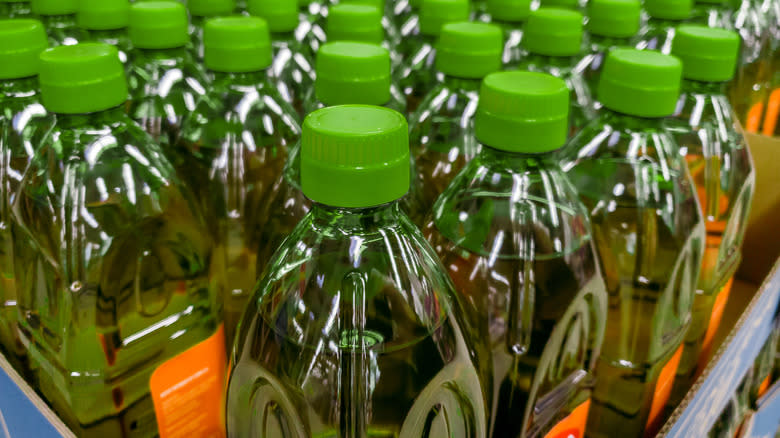Why You Should Think Twice Before Buying Olive Oil In Plastic Bottles

Life is full of choices, and the sheer number of options for purchasing olive oil is honestly more confusing than it should be. Let's talk strictly about containers because while you might find yourself faced with plastic bottles, glass bottles, and even tins of olive oil, there's one that you should avoid.
That's the plastic bottle, and there are a few different reasons for that — even though among those in the industry, it's a surprisingly hot topic of debate. After California Olive Ranch launched its squeeze bottle packaging format, customers were psyched. Who doesn't love an easy way to drizzle some of their favorite olive oil on their salads and other goodies? At that point, the squeeze bottle idea had been around for a few years, but not everyone was on board: Katina Mountanos of the olive oil company Kosterina told ModernRetail: "We would never do a squeeze bottle. Olive oil should never be packaged in plastic."
Why? Olive oil is an ancient delicacy, but plastic has only recently come into the picture. There are a few very good reasons for skipping olive oil in plastic, and along with the environmental impact and shelf stability, studies have shown that consuming olive oil in plastic bottles may expose you to something that's on the rise: Microplastics.
Read more: What These Imitation Foods Are Actually Made Of
Olive Oil Packaged In Plastics Have Been Found To Contain Microplastics

Not all containers are created equal, and in 2014, researchers from UC Davis looked at different methods of packaging olive oil. They found that plastic containers allowed not only light to pass through but air as well — and that, in turn, had the potential to lead to the leaching of particles of microplastics. How many plastic molecules ended up in the olive oil depended on the type of plastic, but the study results have been duplicated.
Fast forward to 2023, when a study from the University of Massachusetts confirmed the presence of microplastics not only in olive oil but also in canola, sunflower, and coconut oils. (Bottles used in the study were purchased from Whole Foods, Nature's Way, and Stop & Shop shelves.)
What does that mean? Microplastics are — at least in the grand scheme of human existence — a relatively new problem we've made for ourselves. While studies are still being done and more information is needed, a 2023 piece from the Yonsei Medical Journal suggests the presence of microplastics has been linked to neurological and reproductive problems and metabolic changes and has been found to be carcinogenic. In other words, it's a huge problem.
There's Also The Environmental Impact To Consider

Katina Mountanos told ModernRetail that one of the reasons her olive oil company, Kosterina, doesn't use plastic bottles is the environmental concern. It found that glass and aluminum are much more environmentally friendly, and that — coupled with health and quality concerns — is a big deal for them.
Interestingly, a very specific scientific study has been done on the environmental impact that EVOO bottles — both plastic and glass — have on the environment and the global supply chain. It was done by the University of Bologna, and after examining the life of the bottles from start to finish, it confirmed that glass bottles were more environmentally friendly.
That's not entirely surprising, but it's nice to see some things confirmed in a scientific setting. And just as there are concerns over microplastics ending up in olive oil and, in turn, us, there are also concerns about them ending up in the environment. Olive oil manufacturer Selo — who says it doesn't use plastic packaging for the reasons we're talking about — points to a joint study from the Chinese Research Academy of the Sciences and North Carolina State University, confirming that when plastic bottles are recycled, microplastics end up in the environment. Seriously, the stuff is everywhere.
Plastic Bottles Can Mean Rancid Olive Oil

In 2011, sensory scientists from UC Davis researched customers' preferences regarding olive oil. They compared customer taste to expert opinions and found something shocking: The olive oils that customers preferred were those that were going rancid. University representatives suggested, "We suspect that the consumers who liked the defective oils' qualities were accustomed to those flavors because many of the imported oils they consume are rancid to begin with."
When UC Davis conducted its study into different packaging materials and how well they protected the olive oil inside, it found that exposing olive oil to heat and light damaged it. (Heat is also potentially damaging, which is why you should never keep your oil near the stove.)
When olive oil is kept in a dark, airtight container, it can remain fresh for years. Transparent plastics and glass caused the opposite to happen. By allowing the olive oil to be exposed to light, it sped up the process called photooxidation. That's the process by which olive oil degrades, and when that happens, it starts to taste bad and lose some of the antioxidant properties it's so lauded for. So, what did they find was the best option? Tin, aluminum, and stainless steel.
Read the original article on The Daily Meal


